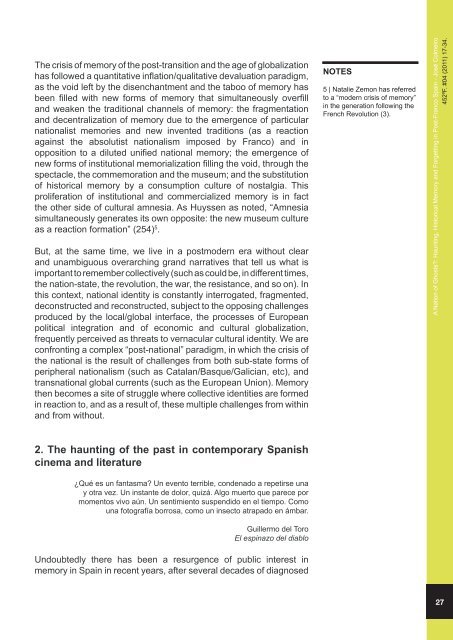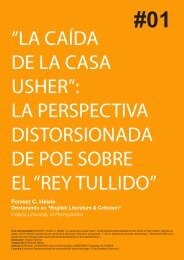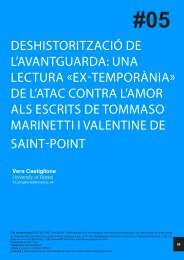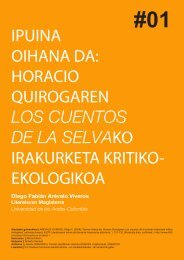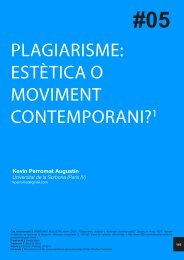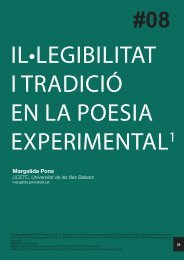a nation of ghosts?: haunting, historical memory and ... - 452ºF
a nation of ghosts?: haunting, historical memory and ... - 452ºF
a nation of ghosts?: haunting, historical memory and ... - 452ºF
You also want an ePaper? Increase the reach of your titles
YUMPU automatically turns print PDFs into web optimized ePapers that Google loves.
The crisis <strong>of</strong> <strong>memory</strong> <strong>of</strong> the post-transition <strong>and</strong> the age <strong>of</strong> globalization<br />
has followed a quantitative inflation/qualitative devaluation paradigm,<br />
as the void left by the disenchantment <strong>and</strong> the taboo <strong>of</strong> <strong>memory</strong> has<br />
been filled with new forms <strong>of</strong> <strong>memory</strong> that simultaneously overfill<br />
<strong>and</strong> weaken the traditional channels <strong>of</strong> <strong>memory</strong>: the fragmentation<br />
<strong>and</strong> decentralization <strong>of</strong> <strong>memory</strong> due to the emergence <strong>of</strong> particular<br />
<strong>nation</strong>alist memories <strong>and</strong> new invented traditions (as a reaction<br />
against the absolutist <strong>nation</strong>alism imposed by Franco) <strong>and</strong> in<br />
opposition to a diluted unified <strong>nation</strong>al <strong>memory</strong>; the emergence <strong>of</strong><br />
new forms <strong>of</strong> institutional memorialization filling the void, through the<br />
spectacle, the commemoration <strong>and</strong> the museum; <strong>and</strong> the substitution<br />
<strong>of</strong> <strong>historical</strong> <strong>memory</strong> by a consumption culture <strong>of</strong> nostalgia. This<br />
proliferation <strong>of</strong> institutional <strong>and</strong> commercialized <strong>memory</strong> is in fact<br />
the other side <strong>of</strong> cultural amnesia. As Huyssen as noted, “Amnesia<br />
simultaneously generates its own opposite: the new museum culture<br />
as a reaction formation” (254) 5 .<br />
But, at the same time, we live in a postmodern era without clear<br />
<strong>and</strong> unambiguous overarching gr<strong>and</strong> narratives that tell us what is<br />
important to remember collectively (such as could be, in different times,<br />
the <strong>nation</strong>-state, the revolution, the war, the resistance, <strong>and</strong> so on). In<br />
this context, <strong>nation</strong>al identity is constantly interrogated, fragmented,<br />
deconstructed <strong>and</strong> reconstructed, subject to the opposing challenges<br />
produced by the local/global interface, the processes <strong>of</strong> European<br />
political integration <strong>and</strong> <strong>of</strong> economic <strong>and</strong> cultural globalization,<br />
frequently perceived as threats to vernacular cultural identity. We are<br />
confronting a complex “post-<strong>nation</strong>al” paradigm, in which the crisis <strong>of</strong><br />
the <strong>nation</strong>al is the result <strong>of</strong> challenges from both sub-state forms <strong>of</strong><br />
peripheral <strong>nation</strong>alism (such as Catalan/Basque/Galician, etc), <strong>and</strong><br />
trans<strong>nation</strong>al global currents (such as the European Union). Memory<br />
then becomes a site <strong>of</strong> struggle where collective identities are formed<br />
in reaction to, <strong>and</strong> as a result <strong>of</strong>, these multiple challenges from within<br />
<strong>and</strong> from without.<br />
2. The <strong>haunting</strong> <strong>of</strong> the past in contemporary Spanish<br />
cinema <strong>and</strong> literature<br />
¿Qué es un fantasma? Un evento terrible, condenado a repetirse una<br />
y otra vez. Un instante de dolor, quizá. Algo muerto que parece por<br />
momentos vivo aún. Un sentimiento suspendido en el tiempo. Como<br />
una fotografía borrosa, como un insecto atrapado en ámbar.<br />
Guillermo del Toro<br />
El espinazo del diablo<br />
Undoubtedly there has been a resurgence <strong>of</strong> public interest in<br />
<strong>memory</strong> in Spain in recent years, after several decades <strong>of</strong> diagnosed<br />
NOTES<br />
5 | Natalie Zemon has referred<br />
to a “modern crisis <strong>of</strong> <strong>memory</strong>”<br />
in the generation following the<br />
French Revolution (3).<br />
A Nation <strong>of</strong> Ghosts?: Haunting, Historical Memory <strong>and</strong> Forgetting in Post-Franco Spain - José Colmeiro<br />
<strong>452ºF</strong>. #04 (2011) 17-34.<br />
27


